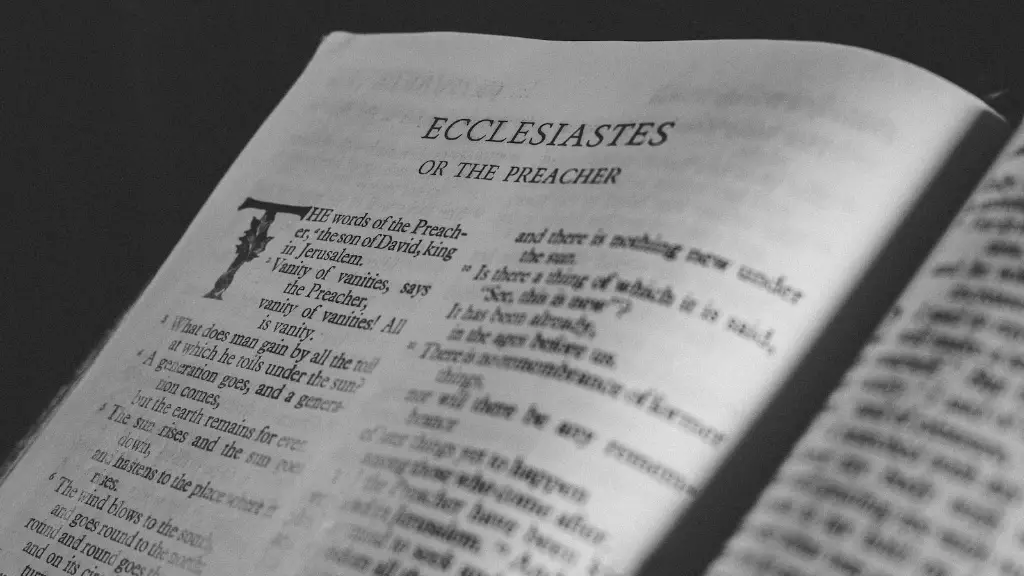What Does The Bible Say About Women In Ministry?
The Bible provides a wealth of information on the role of women in ministry. While many denominations have adopted a more inclusive policy, there are still many interpretations of Scripture that serve to restrict the full participation of women in religious service.
The Christian Bible is comprised of two major parts – the Old Testament and the New Testament. In the Old Testament, women were seen as useful for a variety of roles, but there is no indication that they could serve as spiritual leaders or as priests. Despite this, evidence suggests that women held positions of respect and authority, especially in regard to their own families.
Women played an important role in the New Testament, with many examples of female preachers and leaders. For example, Mary Magdalene was a leader among Jesus’ followers, and she is believed by most scholars to have played a key part in announcing the resurrection to the apostles. Other remarkable examples include Junia and Aquila, Phoebe and Priscilla, who were all highly regarded in their communities.
The importance of women in the development of the early church can be seen in the Bible’s descriptions of them. Jesus himself used women as examples of faithfulness, referring to Mary and Martha as a picture of faithful service. Women were also present at Pentecost and played a vital role in its success.
The New Testament also emphasizes that women are fully equal in their spiritual standing before God. Paul opened Corinthians to women by teaching that in Christ, there is neither male nor female. This revolutionary concept clearly overturns the traditional religious interpretations of the Bible that deny women the same standing as men.
Despite this, there are still various passages in the Bible that some people interpret as restricting the role of women in ministry. These passages are often seen as evidence of God’s desire for male leadership in spiritual matters. They also reflect the historical context in which they were written, which did not necessarily reflect modern views on gender equality.
However, while the Bible may not explicitly support all forms of gender equality that are advocated by modern practitioners, the overwhelming message of the Bible is one of love, respect, and partnership between men and women. Jesus himself was known for his respectful attitude towards women and for his inclusion of them in his ministry.
Is It Biblical For Women To Preach?
The Bible does not provide an explicit answer to the question of whether women should preach. However, in the Bible there are several example of women proclaiming and evangelizing, from Jesus’ female disciples, to the woman at the well, to Priscilla who was instrumental in helping to lead the Christian church in Rome.
The New Testament encourages believers to mentor, teach, and evangelize, which includes helping others to do the same. As such, many Christians believe that God calls and equips people, regardless of their gender, with the skills and interests necessary to serve as ministers of the gospel.
From this perspective, it is important to recognize that while gender is not a barrier to ministry, individual gifts and interests may be. As such, it may be wise for churches to look for qualities and abilities in individuals, rather than placing emphasis on their gender.
Some churches, however, maintain the traditional view that women should not be teachers or preachers, citing various passages in the Bible, such as the prohibition on women speaking in church. Proponents of this view argue that although women have a right to lead, and to use their God-given gifts, they should do so in addition to, rather than in place of men.
At the same time, some Christian denominations have adopted a more inclusive view, and have opened the doors of ministry to women. According to these denominations, while there are certain restrictions on the role of women, such as not teaching with authority over men, there is no Scriptural basis for excluding women from church leadership.
What Does The Bible Say About Women As Church Leaders?
The Bible does not explicitly mention women as church leaders, but there are several passages that suggest that God calls and equips people for ministry, regardless of gender. For example, the book of Philippians speaks of two female co-workers of Paul, Lydia and Euodia, who were evidently involved in the founding of churches.
The New Testament also presents evidence that women were entrusted with teaching and preaching, as well as performing duties of service. In the letters of Paul and Peter, there are several references to women in positions of leadership and service. Examples include Priscilla, who taught Apollos, and Phoebe, who was commended by Paul as a leader in the church of Cenchrea.
The Bible also makes it clear that although men and women are equal in spiritual standing, they have different roles and responsibilities. This is evident in passages such as 1 Corinthians 11:3, where it says that the head of the woman is the man, and in 1 Timothy 2:11-15, which speaks of a woman not teaching with authority over a man.
Ultimately, what it boils down to is the fact that the Bible does not explicitly prohibit women from playing a role in ministry. What the Bible does emphasize is that the gifts and abilities that God has given to each individual should be used for the building up of the church and for furthering the Word of God, regardless of gender.
Does The Bible Encourage Women in Ministry?
The Bible does not explicitly encourage or discourage women’s participation in ministry, but it does provide a wealth of evidence that women played an important role in the early church. It is important to remember, however, that the cultural context of the time may have placed some restrictions on women’s roles, which should be taken into account.
In addition, the Bible emphasizes the importance of using each person’s gifts and abilities to serve God and the church. As such, when assessing the role of women in ministry it is important to bear in mind that God calls and equips individuals for ministry, regardless of gender.
Ultimately, the primary passage to consider when thinking about the role of women in ministry is Galatians 3:28, which states that in Christ there is no male and female. This passage implies that both men and women can be called to serve God, and can use their gifts and abilities for His glory.
Should Women Be Ordained?
The question of whether woman should be ordained is a difficult one, as there are a variety of opinions and interpretations of Scripture. Many denominations have adopted a more inclusive view of women in ministry, allowing for the ordination of women in certain roles. At the same time, other denominations maintain a more traditional view and do not allow for the ordination of women in any role.
Ultimately, it comes down to a matter of personal conviction and opinion. What is important is to ensure that women who feel called to serve in a leadership role are respected and given the chance to do so. After all, it is God who equips and calls individuals to serve, regardless of their gender.
What About Women Pastors?
The role of women pastors is a subject that has been much debated within Christian circles. On the one hand, there is a great deal of Biblical evidence that suggests that women were encouraged to serve in leadership roles, and there are examples of women—such as Lydia, Priscilla, and Mary Magdalene—who were prominent in early church history.
On the other hand, some denominations maintain that only men should be pastors, citing various passages in the Bible. Ultimately, it is up to individual churches to decide if they are willing to ordain women as pastors.
At the end of the day, the decision should be based on an understanding of Scripture, as well as a conviction that women who feel called to serve in ministry should be respected and given the opportunity to do so.
Conclusion
When it comes to the question of what the Bible says about women in ministry, it is important to bear in mind that the Bible encourages respect, fellowship and partnership between men and women in the service of God. It also emphasizes the equality of all believers in spiritual standing before God.
What is key is that each person is equipped and called by God for the purpose of ministry, regardless of their gender. Ultimately, it is up to individual churches and denominations to decide how to best honor this call, based on their own understanding of Scripture.





